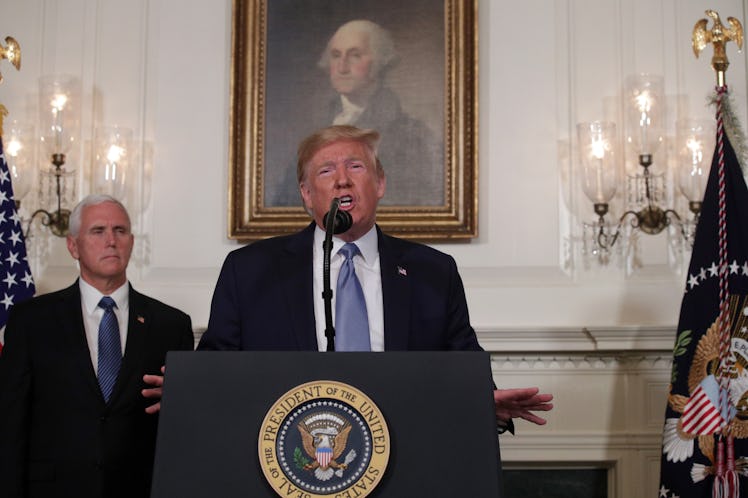
The Trump Administration Is Making A Major Change On Accepting Immigrants
Well everyone, a new week has officially started. On Monday, Aug. 12, the Trump administration unveiled a final version of a new rule that could impact immigrants in the United States. So, what's in the public charge rule? Listen up, because it might be serious.
On Aug. 12, the Trump administration released the final version of a public charge rule that would make it easier for the government to reject immigrants applying for green cards, per The Hill. The rule change would penalize immigrants who use forms of government assistance such as food stamps, subsidized housing, and publicly funded health insurance. Permanent residency, colloquially known as a green card, is a legal status that allows immigrants to work and live in the United States permanently without becoming a U.S. citizen. The term "public charge" comes from the notion that those who use government assistance "depend on public resources to meet their needs,” according to the rule as quoted by The New York Times.
According to The Hill, the rule would connect an individual's immigration status to their income and how often they use government funded programs for resources. This rule was published in the Federal Register on Aug. 12, and is scheduled to take effect in 60 days.
The rule will give the Department of Homeland Security (DHS) more power to deny individuals green cards if they rely on government aid. Opponents to the rule change are concerned that it will discourage immigrants from seeking needed assistance. The New York Times notes that the rule change is expected to primarily affect low-income immigrants who are in the country legally, but rely on some forms of government aid. Officials told the Times that the rule change would not affect people who already have green cards, refugees and asylum seekers, or pregnant women and children.
The U.S. Citizenship and Immigration Services (USCIS) and the White House did not immediately respond to Elite Daily's request for comment.
On Aug. 12, Acting Director of USCIS Ken Cuccinelli announced the public charge rule during a White House briefing. While speaking, Cuccinelli said the rule change is supposed to "protect taxpayers" by making sure immigrants are self-sufficient. He said,
It will also have the long-term benefit of protecting taxpayers by ensuring people who are immigrating to this country don’t become public burdens, that they can stand on their own two feet, as immigrants in years past have done.
The rule change was initially proposed back in September 2018, but this announcement marks the official step by the Trump administration to tighten green card regulations. According to The Los Angeles Times, noncitizen immigrants make up less than 7% of those using Medicaid and less than 9% of those on food assistance. However, critics are concerned that the rule could lead to immigrants not applying for needed programs at all. On Aug. 12, the National Immigration Law Center (NILC) announced plans to challenge the Trump administration's new public charge rule. Executive Director Marielena Hincapié issued a statement following Cuccinelli's announcement, which read in part,
As a leading national organization fighting to advance and defend the rights and opportunities of low-income immigrants, we will fight with every tool we have available to ensure that everyone in our communities has the freedom to thrive and the necessary resources to do so. We look forward to seeing Trump in court — again — and to seeing justice prevail as we defend immigrant families and our democracy.
It appears to be unpopular in general — per the New York Times, even the version of the rule published on the Federal Register came with a note that commenters hadn't liked it. "While some commenters provided support for the rule, the vast majority of commenters opposed the rule,” the acknowledgement read. On social media, many others pushed back on the move, condemning its possible effects on immigrant families.
Judging by the reception the rule change has received, I doubt this will be the last we hear about the public rule charge.